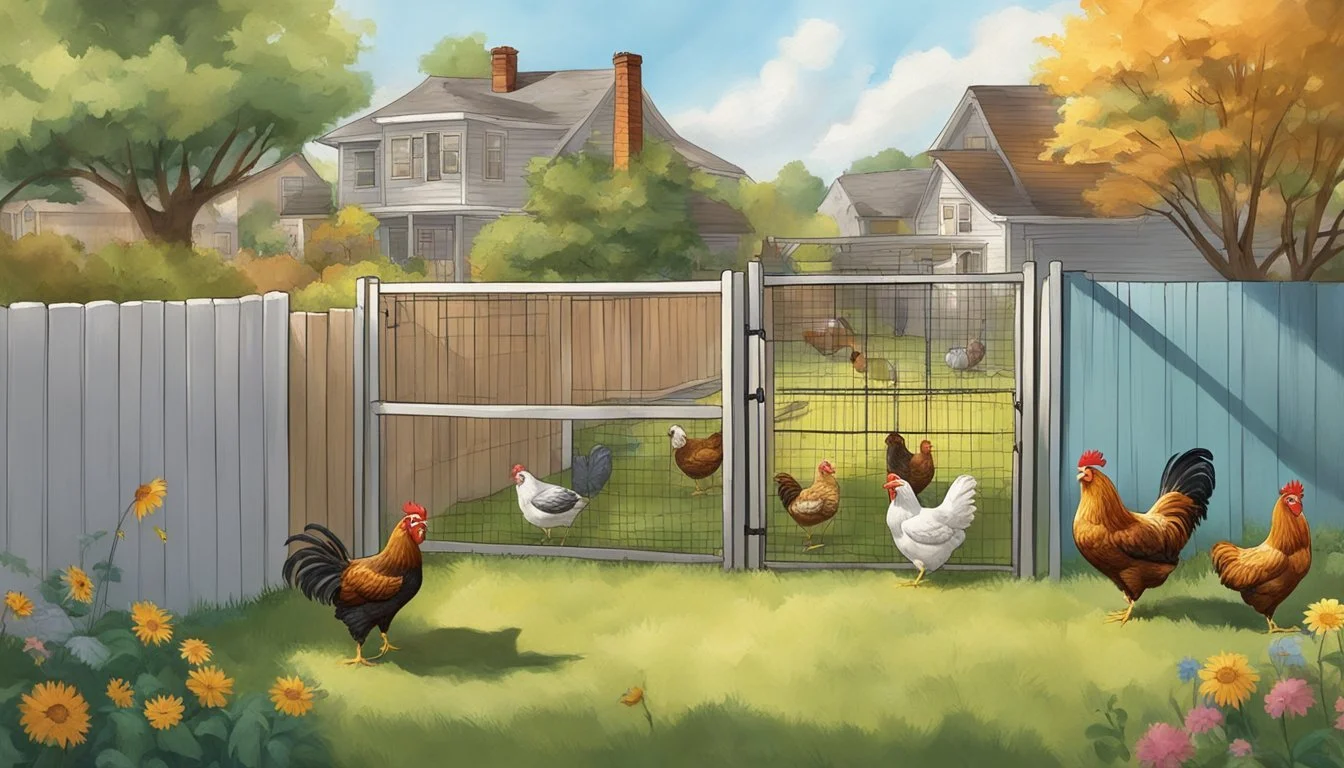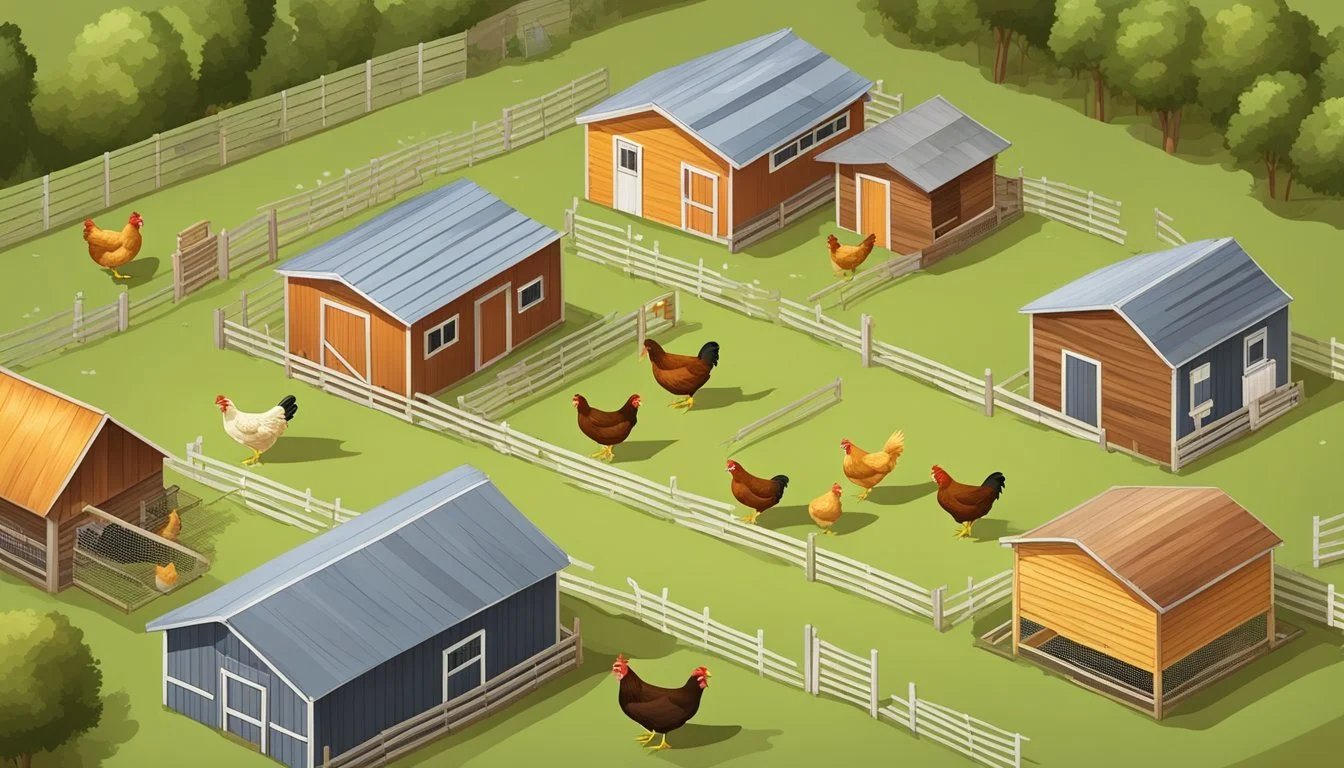Keeping Backyard Chickens in Kansas City, KS
Essential Tips for Urban Poultry Farming
Raising backyard chickens has become an increasingly popular hobby in urban and suburban areas, and Kansas City, KS is no exception. The city allows residents to keep a designated number of hens for eggs, companionship, and as a means of engaging in sustainable practices. However, to ensure the welfare of both the chickens and the community, the local government has set forth specific regulations that provide guidance on what is permissible.https://youtu.be/z6iVfaCYRzA
In Kansas City, KS, individuals are permitted to keep up to six chickens in their backyard. Roosters, known for their loud crowing, are prohibited to minimize noise disruptions within residential areas. Prospective and current chicken keepers are required to apply for a permit to legally house their chickens, adhere to zoning restrictions, and maintain proper distances from neighboring dwellings to avoid any nuisances.
The interest in backyard chickens aligns with nationwide trends toward locally-sourced food and hands-on engagement with food sources. Aside from the fresh eggs and the enjoyment of caring for the birds, chickens also contribute to a household's ecosystem by providing natural pest control and creating compostable waste. Yet, even with the benefits they offer, adherence to the city’s requirements is crucial to harmoniously integrate these feathered friends into Kansas City's neighborhoods.
Legal Considerations
In Kansas City, KS, residents interested in raising backyard chickens must be aware of specific ordinances and permit requirements governing the practice. These regulations are designed to ensure public health and neighborhood harmony.
Understanding Local Ordinances
Local ordinances in Kansas City, KS, strictly regulate the keeping of backyard chickens. The Unified Government of Wyandotte County dictates that chickens are permissible only on agriculturally zoned land. In residential areas, without an agriculture classification, residents may not keep chickens unless they have obtained a special permit issued by the director of animal control. The municipal code prohibits roosters in order to minimize noise disruptions.
Permit Requirements
To legally keep chickens in Kansas City, KS, individuals residing in non-agriculturally zoned areas must navigate the permit application process. This involves:
Contacting Animal Control: Residents must apply to the director of animal control for a special animal permit.
Adhering to Distances: Should a permit be granted, chickens must be kept in accordance with specified distance requirements, such as being at least 100 feet away from any building occupied by or used by neighbors.
Navigating Kansas Municipalities
Each municipality within Kansas may have its own set of rules for keeping backyard chickens. For example:
Wichita: Up to six chickens allowed per property; roosters generally permitted.
Topeka: Up to 12 chickens allowed on properties that are at least 9,000 square feet; rooster policies vary.
Residents should consult their local city code or contact local government offices to ensure compliance with current regulations within their specific municipality.
Preparing Your Property
When setting up for backyard chickens in Kansas City, KS, homeowners must navigate zoning laws and ensure their property is suitable for their feathered inhabitants.
Zoning and Property Lines
In Kansas City, KS, property owners must be aware that keeping chickens is subject to local zoning regulations. Residential properties not zoned as agricultural areas require a permit to keep fowl. One essential step is to determine your property's specific zoning category and consult with Animal Control for the approval process. Remember, chicken coops must not be placed closer than 100 feet to any neighboring residence and should be in accordance with all local ordinance requirements regarding property lines and distances from them.
Choosing the Right Chicken Coop
Selecting an appropriate chicken coop is crucial for the health and safety of the chickens and the cleanliness of the property. Coops must be designed to keep out predators and withstand local weather conditions. Coops should also be clean and sanitary, free from offensive odors and pests. Kansas City regulations specify that coops cannot be located within 5 feet of a side-yard property line or 18 inches of a rear-yard property line. Proper ventilation, feeders, and drinkers should also be part of the coop's design to promote a healthy flock.
Lot Size Considerations
Lot size directly impacts how many chickens a property owner may keep. For smaller lots, this may mean a limitation on the number of chickens or possibly not being able to keep them at all. While the search results provide conflicting information about the maximum number of chickens allowed, it's important to check the current city ordinances as these can change. Typically, larger lots exceeding one acre may allow for more chickens, but it is still important to follow all chicken coop placement rules, ensuring that the structures are set back from property lines and neighbors' dwellings by the legally required distances.
Chicken Care Essentials
When raising backyard chickens, prioritizing their health and managing their living environment are crucial. Keeping the coop clean and understanding proper waste disposal significantly contribute to the success of chicken keeping.
Maintaining a Healthy Flock
To maintain a healthy flock, consistent health checks and a balanced diet are essential. A chicken's diet should include grains, proteins, and greens, ensuring they have the nutrients they need. Regular observation for signs of disease or distress is vital for early detection and treatment. Vaccinations and parasite control efforts are also necessary to prevent common poultry ailments. Minimizing the flock's stress by providing ample space and proper handling can prevent behavioral issues and promote well-being.
Coop Management and Sanitation
A well-maintained coop is paramount for reducing nuisance and smell, keeping chickens safe, and preventing diseases. Coops and runs should be spacious enough for the number of chickens kept, usually providing at least 3-4 square feet per chicken inside the coop and 8-10 square feet per chicken in the run. Cleaning should include:
Daily: Remove soiled bedding and droppings.
Weekly: Change bedding and scrub feeders and waterers.
Monthly: Conduct a thorough cleaning of the entire coop, including walls and nesting boxes, and inspect for signs of wear or pest infestations.
Proper ventilation is important to clear ammonia build-up, which can cause respiratory issues among the birds.
Composting and Waste Disposal
The waste produced by chickens can be turned into a resource through composting. It enriches the soil with a high-nitrogen content, ideal for garden use. However, an effective composting system must be in place to mitigate the smell and reduce the attraction of pests. Layering the chicken waste with carbon-rich materials like dry leaves or straw can aid in proper composting. This should be done at an appropriate distance from the backyard coop to prevent any smell from affecting the living space while ensuring the coop area remains clean and sanitary. Regular turning of the compost pile will help with aeration and speed up the decomposition process.
Community and Neighbor Relations
When keeping backyard chickens in Kansas City, KS, it is crucial to maintain positive relations with the community and neighbors. The responsible management of backyard chickens involves addressing concerns, understanding homeowners' association rules, and resolving any issues effectively.
Managing Neighbor Concerns
Residents must ensure that their chicken coops are at least 100 feet away from neighboring dwellings. In areas such as Prairie Village, Shawnee, Mission, and Roeland Park, adhering to this distance is essential to minimize disturbances. Residents are encouraged to communicate with their neighbors to address worries over noise, smell, and potential property damage. Keeping the coop clean and hens well-cared for will significantly reduce common concerns.
Key Strategies for Neighbor Relations:
Maintain regular cleanup to prevent odors.
Keep noise to a minimum by avoiding roosters.
Engage in open dialogue to address neighbor concerns promptly.
Homeowners' Association Rules
Before acquiring chickens, residents should review the rules set forth by their local homeowners' association. In some cases, the association may have more restrictive rules than city ordinances, or they may require additional permits. Residents of communities with active associations should ensure compliance with all regulations to avoid penalties.
Document Checklist:
Association bylaws
Permit requirements
Restrictions on the number or type of chickens
Nuisance and Complaints Resolution
If a complaint is filed, the local animal control may be involved in resolving the issue. The Unified Government of Wyandotte County outlines that chickens cannot be kept closer than 100 feet to any building used by humans. To prevent complaints, residents must manage their chickens responsibly and adhere to municipal regulations. In case of persistent issues, a watchdog reporter or ombudsman could assist in mediating and finding a resolution.
Steps for Resolving Complaints:
Understand the specific complaint filed.
Communicate with the reporting neighbor to seek an amicable solution.
If necessary, modify chicken coop or management practices according to regulations.
In conclusion, successful backyard chicken keeping in Kansas City, KS, requires mindful management with an emphasis on good relations with neighbors and strict adherence to local regulations.
Regulations on Chicken Types and Numbers
In Kansas City, Kansas, residents are subject to specific regulations regarding the types of chickens they can keep and the number allowed. These rules are in place to maintain harmony within residential areas and ensure the wellbeing of the chickens.
Restrictions on Types of Chickens
Kansas City, Kansas, enforces a restriction on roosters within city limits to minimize noise disruptions. Residents are allowed to keep hens only, which are female chickens. Compliance with this regulation is crucial and individuals must adhere to keeping hens exclusively, as roosters are not permitted.
Quantity Limits for Backyard Chickens
The city allows residents a maximum limit of up to 6 chickens. This applies to backyard chickens and is the total number allowed per household. Keeping chickens within these limits helps maintain cleanliness and orderliness in the community. The regulation of up to 6 chickens pertains to hens, as they are the only type of chicken residents may raise. It's important for residents to contact animal control or local authorities if they are considering keeping any fowl to ensure their compliance with local ordinances.
Handling Specific City and Area Policies
In the Kansas City area, backyard chicken keeping is governed by local ordinances that vary from city to city, tailored to address the density, noise, and overall community impact of such activities.
Overland Park and Johnson County Regulations
Overland Park, part of Johnson County, Kansas, has set regulations permitting residents to keep backyard chickens on lots sized greater than 0.20 acres. This is a reduction from previous restrictions, making it more accessible for city residents to partake in chicken keeping. However, they have specified that only hens are allowed, proscribing roosters to mitigate noise disturbances.
Lenexa and Olathe, also within Johnson County, have their own sets of regulations which residents must consult to ensure compliance when keeping backyard chickens.
Policy Variation Across Kansas Cities
Each city in the Kansas area has its unique approach:
Kansas City, Kansas: Chicken keeping is generally limited to agriculturally zoned land. Residents can request a special permit from the director of animal control for non-agricultural zoning.
Wichita: Up to six chickens are allowed with no rooster permitted. Chickens must be penned.
Topeka: Residents can have up to five chickens, with at least 20 feet of space from neighboring homes.
Lawrence: Allows up to 20 chickens depending on the size of the property, with a required distance of 10 feet from property lines.
Manhattan: The city allows a certain number of chickens based on property size and requires coops to be 25 feet away from any neighbor's dwelling.
Salina: Regulations here are much stricter; chicken keeping is primarily not permitted in residential areas.
The Overland Park City Council is known to periodically review and update these regulations, which means that current standards can be subject to change and residents should stay informed of the latest ordinances.
Financial Considerations
Keeping chickens in Kansas City, KS, requires careful financial planning and awareness of associated costs. This section will focus on initial and recurring expenses, and the implications of permit fees that may be applicable.
Budgeting for Chicken Keeping
When planning to keep chickens, individuals must consider both start-up and ongoing expenses. Initial costs typically include:
Coop construction or purchase: Reliable shelter is crucial for safety and to maintain a healthy flock. The price can vary significantly based on size and materials.
Feeders and waterers: Essential equipment for daily nourishment; one-time expenses.
Fencing: Protection against predators and to prevent escape; cost depends on the perimeter of the designated area.
Chickens: The price per bird can vary, especially if purchasing specific breeds.
Recurring costs comprise feed, which can fluctuate based on chicken count, seasonal bedding, health care, and pest control products. Becoming self-sufficient by producing eggs can lead to long-term savings when compared to the cost of eggs from a grocery store.
Understanding Permit Fees and Expenses
Residents planning to keep chickens must familiarize themselves with local regulations, as pilot programs or zoning laws may necessitate a permit. Permit fees can be a one-time cost or a recurring expense, depending on municipal regulations. In some cases, such as when operating on a quarter-acre or less, additional requirements might apply. The fee structures are designed to ensure commitment to proper chicken husbandry and community safety. As of the knowledge cutoff in 2023, specific permit fee amounts are not provided, but individuals can contact their city's relevant departments for the latest information.
Prospective chicken keepers should account for these costs when evaluating the overall cost-effectiveness of raising backyard chickens. Compliance is vital not only for legality but also to maintain neighborly relations and community health standards.
Educational and Community Engagement
Kansas City, KS, harnesses backyard chicken keeping to enhance education and promote community bonding. Initiatives focused on K-12 schools and local workshops support practical skills and welcome residents into a learning-friendly environment.
School Programs and Community Workshops
K-12 School Programs often integrate chicken keeping into their curricula. They provide students with hands-on experience that fosters responsibility and understanding of life cycles. Schools utilize coop installations for subjects like biology and agriculture, cementing theoretical knowledge with tangible practice.
Practical Benefits for students include:
Understanding animal care and welfare
Learning sustainable food production practices
Developing agricultural skills applicable to urban settings
Community workshops welcome individuals of all ages to participate in backyard poultry education. Local non-profits and agricultural extension offices regularly hold sessions on:
Setting up a proper chicken coop
Caring for hens effectively
Complying with local ordinances and regulations
Promoting Urban Agriculture Education
Promotion of urban agriculture is crucial to Kansas City's efforts, with educational programs spotlighting the environmental and social advantages of backyard chicken keeping. Through community engagement, the city offers residents resources to establish their own urban farms, thereby increasing local food production and enhancing food security.
Community Engagement involves:
Collaborating with local food initiatives
Partnering with community gardens
Providing access to educational materials and support networks
Conclusion
In Kansas City, KS, individuals have the opportunity to engage in urban chicken keeping within specific regulations designed to respect both the hobbyists and their neighbors. With a limit of six hens and a clear ban on roosters to control noise, the guidelines ensure a balance between urban living and the benefits of raising chickens.
The necessity for a permit upholds a standard of responsibility and community respect. Prospective chicken keepers are encouraged to remain informed about the regulations to maintain compliance and community harmony.
Council members continue to evaluate the rules to adapt to the interests of residents. The evolving dialogue showcases a commitment to responsive governance.
Residents can take pride in contributing to sustainable living practices by producing fresh eggs and benefiting from natural pest control. Their adherence to set rules reflects a display of confidence and knowledge in their pursuit.
Awareness and compliance with the regulations set by the Unified Government of Wyandotte County are crucial. They are thoughtfully designed to meet the needs of those keeping backyard chickens and the community as a whole.









